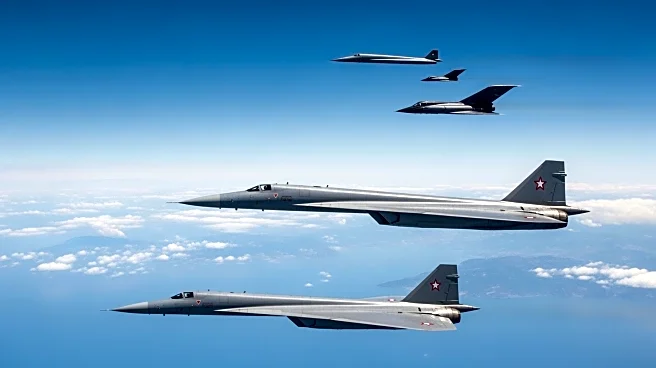What's Happening?
The United States military has conducted a strategic deployment of two supersonic B-1 Lancer bombers to the coast of Venezuela. This move follows a similar operation involving B-52 Stratofortress bombers and
Marine Corps F-35B stealth fighter jets in the region. The deployment is part of a broader military buildup in the Caribbean Sea, which includes eight warships, P-8 maritime patrol aircraft, MQ-9 Reaper drones, and a submarine. The operations are reportedly training exercises simulating attacks, but they have raised speculation about potential military actions against Venezuelan President Nicolás Maduro, who faces narcoterrorism charges in the U.S. President Trump has denied that the flights are intended to increase military pressure on Venezuela, although he has expressed dissatisfaction with the country, particularly concerning drug trafficking.
Why It's Important?
This military activity underscores the escalating tensions between the United States and Venezuela, particularly in the context of the Trump administration's aggressive stance against drug trafficking in South America. The deployment of advanced military assets like the B-1 bombers and F-35 jets highlights the U.S.'s readiness to project power in the region. This could have significant implications for U.S.-Venezuela relations and may affect regional stability. The operations also reflect the U.S.'s broader strategy to combat drug trafficking, which has been likened to the war on terrorism. The presence of such a formidable military force in the Caribbean could deter illicit activities but also risks escalating military confrontations.
What's Next?
The U.S. military's continued presence and operations in the Caribbean suggest that further actions could be taken to combat drug trafficking. President Trump has indicated a willingness to extend operations to land-based targets, pending discussions with Congress. The international community and regional governments will likely monitor these developments closely, as any escalation could have broader geopolitical consequences. The U.S. may also face diplomatic challenges in justifying its military actions in the region, particularly if they lead to increased tensions or conflict.
Beyond the Headlines
The U.S. military's operations in the Caribbean raise questions about the legal and ethical implications of such actions, particularly in terms of sovereignty and international law. The comparison of drug trafficking to terrorism by U.S. officials suggests a shift in how these issues are framed and addressed. This could lead to changes in international norms and policies regarding drug enforcement and military intervention. Additionally, the presence of advanced military technology in the region may influence future military strategies and alliances.










